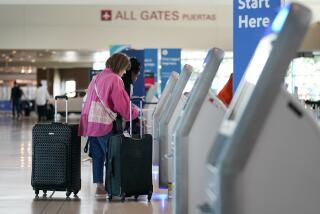House Votes to Ban Smoking on Shorter Flights
- Share via
WASHINGTON — In a landmark, bipartisan vote, the House narrowly approved legislation Monday night banning cigarette smoking on all domestic airline flights lasting two hours or less.
The controversial proposal by Rep. Richard Durbin (D-Ill.), which was approved 198 to 193 after an acrimonious debate, now goes to the Senate, where it faces an uncertain future.
“With this legislation, we are sending a message to the American people . . . that it is wrong to impose the health dangers of smoking on the vast majority of people who are confined to their seats in an airplane cabin and are nonsmokers,” Durbin said.
The smoking ban marks the first time either house of Congress has voted on the issue of passive smoking, a health problem that has gained wide attention in recent years. Studies by the National Academy of Sciences and other groups have suggested that nonsmokers who are exposed to cigarette smoke run a high risk of developing lung cancer and other diseases.
Durbin’s amendment, which was tacked onto an $11.1-billion transportation appropriations bill, would affect 80% of all U.S. airplane flights, according to Federal Aviation Administration officials.
The transportation spending measure cleared the House in a 282-108 vote.
The smoking ban proposal exempted transcontinental flights, sponsors said, because it would be “unfair” to force smokers to abstain for four hours or longer.
Currently, federal law bans cigarette smoking on all flights carrying 30 passengers or less and requires airlines to set aside non-smoking sections on all other planes. Cigar and pipe smoking are banned on all United States flights.
Flurry of Objections
During an emotional debate that stretched into the late evening, opponents raised a flurry of objections to Durbin’s amendment. They said the health dangers of passive smoke have not been clearly established and argued that airports would be hard-pressed to enforce the law.
Under the proposal, airports could bar from landing planes that failed to enforce the smoking ban. Airports which refused to obey such a policy would no longer be eligible for millions of dollars in federal funds for capital improvements.
“We’re turning the airports of this country into policemen with such a proposal,” Rep. Tom DeLay (R-Tex.) said. “How is an airport director going to know that a plane flight that lasted just under two hours enforced the ban . . . but the plane that took three hours to fly from Houston to Los Angeles wasn’t covered by the law?”
DeLay also contended that the National Academy of Sciences had not “conclusively” proved the correlation between exposure to cigarette smoke and higher incidences of lung cancer, saying far more study was needed before Congress took such radical action.
Members of the airline industry, including pilots associations and airplane companies, also opposed the measure, predicting that many passengers would simply smoke in airplane restrooms, posing serious safety threats to an aircraft.
“This is a very misguided bill . . . it would increase safety risks on the planes,” Rep. Harold Rogers (R-Ky.) said. “Think of a passenger just tossing a cigarette into a wastebasket on a plane, and what could happen next?”
‘Captive Passengers’
However, Durbin and other sponsors said the amendment created long overdue protections for the “captive passengers” in an airplane who are routinely encircled by clouds of obnoxious cigarette smoke.
“It’s a life and death issue, when you consider the health consequences,” said Rep. Robert K. Dornan (R-Garden Grove), who favored an even tougher ban on virtually all domestic flights. “All we’re talking about is civility and decency to people who just don’t want to breathe contaminated air.”
Rep. Henry A. Waxman (D-Los Angeles) added that the smoking and nonsmoking divisions in the cabins of smaller planes are meaningless because smoke still permeates the entire airplane cabin and nonsmokers cannot escape the tobacco fumes. Congress “has an obligation to protect smokers from imposing on nonsmokers in such a fundamental way,” he said.
Long-Term Health Threats
Others were swaged by the longterm health threats of passive smoke.
Rep. Robert G. Torricelli (D-N.J.) said: “Any of us who walked on an airplane and saw a young child puffing away on a cigarette would be appalled, and we would want to stop that immediately. The issue of passive smoke . . . is no different. We can’t ignore this problem any longer.”
Durbin’s amendment was supported by the National Academy of Sciences and a multitude of health organizations, including the American Medical Assn., the American Cancer Society, the American Heart Assn. and the American Diabetes Assn.
More to Read
Get the L.A. Times Politics newsletter
Deeply reported insights into legislation, politics and policy from Sacramento, Washington and beyond. In your inbox twice per week.
You may occasionally receive promotional content from the Los Angeles Times.










